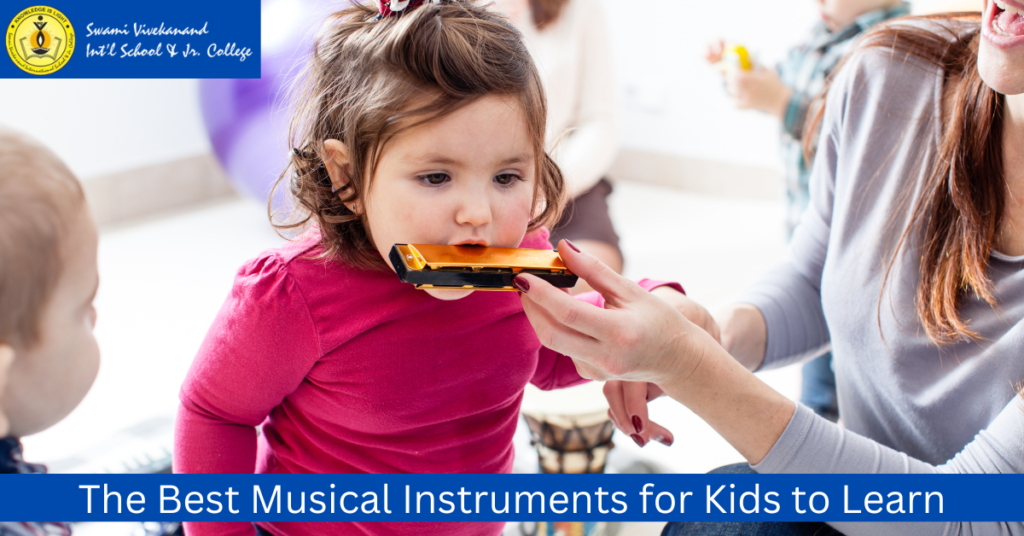At Swami Vivekanand International School (SVIS), we encourage musical education for children, as learning an instrument provides numerous cognitive, emotional, and social benefits. The best musical instrument for a child to learn depends on their age, interests, and physical abilities. Below are some of the top instruments that are well-suited for kids:
- Piano/Keyboard
Why It’s Great: The piano is one of the best instruments for kids to start with because it lays a strong foundation in music theory. It helps them understand notes, rhythm, and melody. The keyboard version is a more portable and accessible option.
Age Range: Suitable for kids aged 5 and up.
Benefits: Enhances hand-eye coordination, improves concentration, and helps develop both hands’ dexterity. - Ukulele
Why It’s Great: The ukulele is smaller and easier to handle than a guitar, making it an ideal string instrument for young kids. It has fewer strings (four) and is easy to learn, which boosts a child’s confidence as they can play simple songs quickly.
Age Range: Suitable for kids aged 5 and up.
Benefits: Encourages fine motor skills, develops rhythm, and builds confidence as kids progress quickly. - Recorder
Why It’s Great: The recorder is a simple wind instrument that’s often introduced in school music programs. It’s inexpensive, easy to play, and great for teaching kids the basics of reading music.
Age Range: Suitable for kids aged 6 and up.
Benefits: Teaches breath control, note reading, and improves listening skills. - Violin
Why It’s Great: The violin is a popular choice for children because of its size range and adaptability to different ages. Starting with the violin can teach kids discipline, finger coordination, and ear training.
Age Range: Suitable for kids aged 6 and up.
Benefits: Enhances fine motor skills, develops pitch accuracy, and improves focus and discipline. - Drums/Percussion Instruments
Why It’s Great: Drums are perfect for kids with a lot of energy. They can start with simple hand drums or percussion instruments like tambourines or maracas, eventually advancing to a full drum set.
Age Range: Suitable for kids aged 4 and up.
Benefits: Develops a strong sense of rhythm, coordination, and allows for physical expression. - Guitar (Acoustic or Classical)
Why It’s Great: The guitar is a versatile and widely popular instrument. For younger children, a classical guitar with nylon strings is recommended because it is easier on the fingers.
Age Range: Suitable for kids aged 7 and up.
Benefits: Strengthens hand coordination, fosters creativity, and provides a lifelong skill. - Drum Pads/Xylophone
Why It’s Great: Percussion instruments like drum pads or a xylophone offer a fun and engaging way for younger kids to get involved in music. These instruments are easy to pick up and encourage early rhythm development.
Age Range: Suitable for kids aged 3 and up.
Benefits: Improves motor skills, timing, and introduces basic musical patterns. - Harmonica
Why it’s Great: The harmonica is a small, portable wind instrument that’s easy for kids to carry around and play anywhere. It’s also relatively easy to learn, making it a fun option for kids.
Age Range: Suitable for kids aged 6 and up.
Benefits: Improves breath control, teaches melody and harmony, and is portable.
Choosing the Right Instrument
Interest and Enthusiasm: Encourage your child to choose an instrument they’re interested in. This will keep them motivated to practice and enjoy the learning process.
Physical Readiness: Some instruments, like the guitar or violin, require fine motor skills and hand strength, so choose an instrument that suits your child’s physical development.
Access to Lessons: Consider the availability of teachers and lessons for the instrument. Some instruments, like the piano and guitar, have more resources for beginners.
At SVIS, we foster musical exploration and ensure that children have access to a variety of instruments through our music programs, helping them discover their musical passions while building important life skills.






